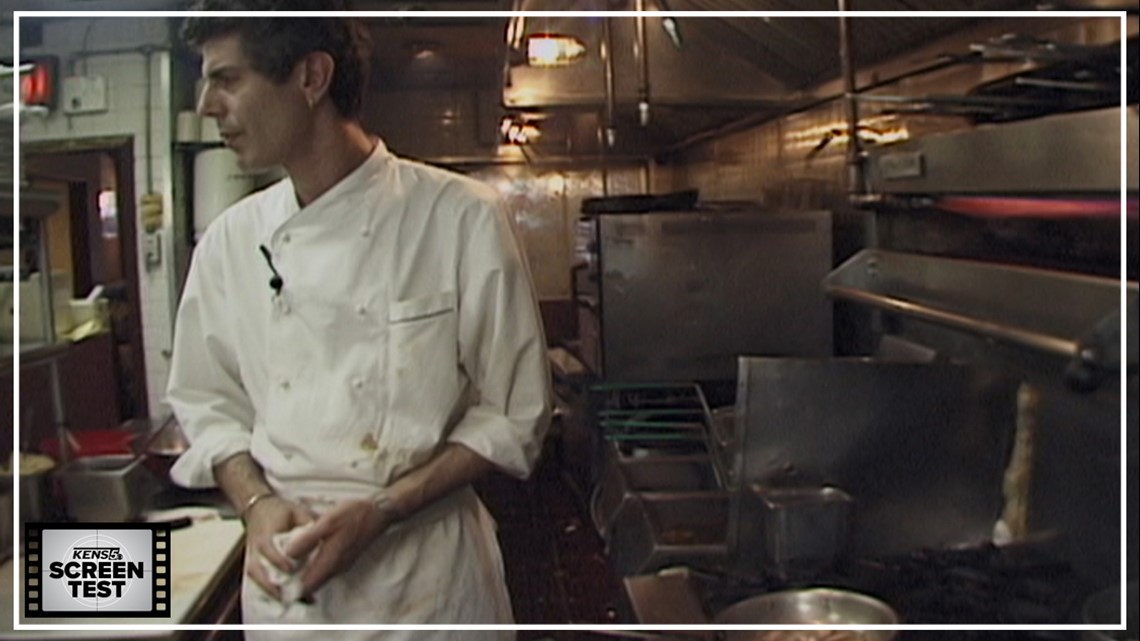Trigger warning: This story discusses suicide. The National Suicide Prevention Lifeline is a hotline for individuals in crisis or for those looking to help someone else. To speak with a certified listener, call 1-800-273-8255.
“Roadrunner,” a new documentary centered on the later stages of Anthony Bourdain’s life when he suddenly found himself on the global stage, opens with the chef-turned-author-turned-superstar-traveler sipping a beer beach-side while contemplating how he’d like to be remembered. The waves softly lap behind him. We don’t see who he’s addressing; it may be no one. We might imagine this to be heaven.
Though it’s been more than three years since the world lost Bourdain, “Roadrunner” arrives at a point when the shock of his suicide still hasn’t subsided. How could a figure with a seemingly infinite reservoir of unvarnished curiosity suddenly decide he’d seen enough? Is it something we would even want a documentary to consider when the mystery will linger over our experience of watching it anyway? What should the objective of the filmmaker, Morgan Neville, be in this case: To remind about his subject at his most outwardly joyful, or to reckon with why that joy may have expired?
For roughly two-thirds of this roughly two-hour film (releasing Friday in theaters), that first observation in “Roadrunner” is as explicit as things get about Bourdain’s death. Neville, who has directed profiles of people widely known (“Won’t You Be My Neighbor?”) and of people on the precipice of it (“20 Feet From Stardom”), has crafted another generally involving and briskly paced chronicle of celebrity, here focusing on the contradictory border Bourdain treaded separating genuine humanity and TV artifice. The earliest archival footage is sourced from the late-’90s as Bourdain prepares to take the first steps into the spotlight and the rest of his life, and so while we don’t see him as a child, “Roadrunner” does chronicle his infancy in the public sphere as he ruptured stereotypes of the “cuddly and adorable” chef, as he describes it, riding the explosion into overnight stardom with the publication of his bestselling book “Kitchen Confidential” and ensuing forays into travel and TV.
It’s hard to imagine feeling unsatisfied with these earlier stretches of “Roadrunner,” as Neville essentially provides the CliffNotes on Bourdain’s burgeoning reputation, guided by those who worked with him and often returning the man himself to the center of the frame. Sequences which depict him overcoming a shyness of fame while venturing through Asia may not be as formally mischievous as Bourdain himself, but they are as wise—that his producing team recalls being frustrated over his initial discomfort only confirms how human he was before warming up to the role (an evolution marked by Neville’s rather fascinating repurposing of Colin Stetson’s sinister orchestral arrangements for “Hereditary,” the melodies of which here ring of liberating transformation). Even those unfamiliar with Bourdain’s uncanny ability to turn a phrase while turning our perspective about a different culture may find themselves swept up in the front-facing thrill of discovery that came to define his reputation.
Sure, much of “Roadrunner” is what we’d consider traditional documentary; talking heads, a greatest-hits ethos, an abundance of behind-the-scenes footage and all. Unremarkable (and I don’t mean “uninteresting”) filmmaking capturing a remarkable life. But there’s something nonetheless affirmative, if slightly obvious, about how what we see verbalizes what’s always been implied about Bourdain’s trademark empathy. Has any one person done more for the world’s unsung voices in the age of dominant and inaccurate cultural assumptions? That he so passionately defied expectations of his privilege to enlighten the Travel Channel and CNN-watching masses is slyly referenced when “Roadrunner” at one point cuts from a pool of pig’s blood in the Congo River to a Hollywood red carpet. That he did so with a humble, personable, endearingly profane voice is encapsulated with each heart-swelling outtake as well.
While it’s one thing to recognize Bourdain’s authenticity, it’s another task to get at the root of it. Perhaps that’s why the last 40 or so minutes of “Roadrunner” feel more contemplative than celebratory as Neville tries to shoulder the burden of answering questions that can’t be answered and providing closure where closure is impossible. “Roadrunner” wades into the hazier waters of Bourdain’s final months and beyond, trading in rose-tinted glasses for the raised eyebrows of longtime collaborators speculating about the changes in demeanor and seeming lack of fulfillment in the eyes of someone who always seemed like he needed little more than the chill of the Pacific breeze or taste of European flavor to savor life.
“Roadrunner” takes turns for the supremely frank, which means plenty of these last testimonials will be uncomfortable and heartbreaking to watch at the least. That’s to be expected. At other points, though, Neville gives his interviewees enough space to make us think the filmmaker is turning the tables on his subject and Asia Argento, Bourdain’s last partner and someone we don’t see interviewed here, leaving us a tad skeptical about where Neville believes the line in the sand to be drawn. And it’s difficult to buy into the use of Bourdain’s own candid reflections on mortality and happiness as a device of “responding” to those speaking in his absence.


To Neville’s credit, confronting the darkness biting at the edges of Bourdain’s exploits reframes everything else we have seen, not by draining a legacy of its worth but by reminding us that how we view one’s legacy is rarely the same as how they’re creating it. On the other hand, a profile of the documentary’s production by The New Yorker published in the time since most of this review’s sentiments were put to page reports Neville went to artificial ends to create eerie robotic simulations of his subject’s voice for “three quotes”—a tactic the documentary itself dubiously doesn’t indicate, further mystifying Neville’s ultimate intentions. Alas, we probably shouldn’t expect this to be the last time deepfake technology is used in documentary; history shows rules of the medium are more often observed as guidelines, and the magicians behind the scenes only seem to be finding new depths to their bag of tricks. It’s how innovations happen, it’s how stumbles happen. And it’s how they might happen with the same filmmaking stroke, at which point we respond with the careful consideration that we should bring to every movie – nonfiction or fiction – while also understanding that the only thing that can possibly be called genuine about the act is what and how we feel watching something.
Call it a burden, call it a reward. I’m inclined to think it’s a hefty bit of both, that it’s what makes the movies the movies. And in the case of “Roadrunner,” and the perspective of Bourdain’s life that now feels a bit less his own and a bit more of someone’s who never met him, it may encapsulate our limits of appreciating and mourning and knowing, despite our best efforts and desires. There’s some value in that which Neville likely didn’t intend. Like Bourdain himself, this movie of his life is a contradiction. To borrow the (real) words of an interviewee in the documentary’s closing minutes, and in one of its purest sentiments, “I don’t think we get to know.”
"Roadrunner" is rated R for language throughout. It's available Friday in theaters.
Featuring: Anthony Bourdain, Ottavia Bourdain, David Chang, Josh Homme
Directed by Morgan Neville
2021
MORE REVIEWS:
- ‘Pig’ Review: Whatever you expect this Nic Cage thriller to be, it isn’t
- ‘Black Widow’ Review: Natasha Romanoff's sorta-solo outing buckles under the strain of MCU spectacle
- ‘No Sudden Move’ Review: Steven Soderbergh reasserts himself as master of the caper
- ‘The Tomorrow War’ Review: A sci-fi mashup as derivative as its title suggests
- ‘The Sparks Brothers’ Review: An odd and operatic documentary about an odd and operatic musical duo
- 'Luca' Review: Don't overlook one of Pixar's simplest, most human tales
- ‘In the Heights’ Review: The diaspora of dreams
- These are the best movies released so far in 2021

